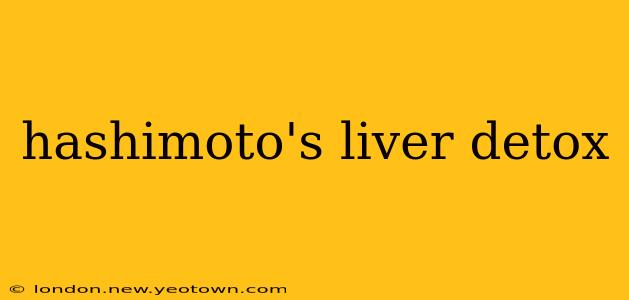Hashimoto's thyroiditis, an autoimmune disease attacking the thyroid gland, often presents with a range of symptoms beyond just thyroid issues. Many individuals find themselves exploring ways to support their overall health, and liver detoxification is frequently a topic of interest. But is a liver detox necessary for someone with Hashimoto's? And if so, how should it be approached? Let's unravel this complex relationship.
It's crucial to preface this by stating that there's no single "Hashimoto's liver detox" regimen endorsed by mainstream medicine. The concept of a "detox" itself is often oversimplified and sometimes misleading. Your liver is a remarkable organ constantly working to filter toxins. However, supporting its function can be beneficial, especially when dealing with an autoimmune condition like Hashimoto's.
What is Hashimoto's Thyroiditis?
Before diving into liver support, let's briefly review Hashimoto's. This autoimmune disorder causes the body's immune system to mistakenly attack the thyroid gland, leading to inflammation and impaired thyroid hormone production. This can manifest in symptoms such as fatigue, weight gain, brain fog, constipation, and depression. The severity varies greatly from person to person.
Does Hashimoto's Impact the Liver?
While Hashimoto's primarily affects the thyroid, there's a growing understanding of its potential broader impact on the body. The inflammation characteristic of autoimmune diseases can, in some cases, affect other organs. While direct liver damage is not a typical symptom of Hashimoto's, some individuals may experience related symptoms like fatigue and digestive issues that can indirectly impact liver function. This is why supporting liver health becomes a valuable aspect of overall Hashimoto's management.
How Can I Support My Liver Health with Hashimoto's?
Supporting your liver isn't about a quick fix "detox," but rather about adopting long-term healthy habits. These practices work synergistically to improve overall health, benefiting the liver and supporting thyroid function.
1. Prioritize a Nutrient-Rich Diet:
- Focus on whole foods: Emphasize fruits, vegetables, lean proteins, and healthy fats. These provide the building blocks for optimal liver function. Avoid processed foods, excessive sugar, and unhealthy fats, which can burden the liver.
- Support detoxification pathways: Incorporate cruciferous vegetables (broccoli, cauliflower, kale) and foods rich in sulfur compounds, known to aid detoxification processes.
2. Hydration is Key:
Water is crucial for flushing out toxins and supporting all bodily functions, including liver function. Aim for adequate daily water intake.
3. Gentle Movement and Exercise:
Regular physical activity, even moderate exercise like walking, improves circulation, which is essential for liver health.
4. Stress Management:
Chronic stress can negatively impact liver function. Practicing stress-reduction techniques like yoga, meditation, or spending time in nature can be beneficial.
5. Adequate Sleep:
Prioritize 7-9 hours of quality sleep per night. Sleep is vital for cellular repair and detoxification processes.
What are the common liver problems associated with Hashimoto's?
While direct liver damage isn't a typical Hashimoto's symptom, indirect issues can arise. These are often related to the overall inflammatory burden and compromised metabolic function associated with the condition. Some individuals may experience fatigue, digestive problems (which can impact liver function), or metabolic imbalances that may need addressing. It’s vital to consult a physician about any specific liver concerns.
What supplements might help support liver health in Hashimoto's?
It is crucial to consult your doctor before taking any supplements. Some individuals with Hashimoto's may benefit from certain nutrients to support liver function. However, these should be considered under medical guidance, as some supplements can interfere with thyroid medication or trigger other health issues. Examples often suggested (under medical supervision only) include milk thistle, NAC, and other antioxidants.
Are there specific foods to avoid when supporting liver health with Hashimoto's?
While no foods are universally "forbidden," it’s wise to minimize processed foods, excessive sugar, alcohol, and foods you’ve identified as causing digestive issues. These can increase the liver's workload and potentially exacerbate inflammation.
Conclusion:
Supporting liver health is a valuable part of holistic Hashimoto's management. However, it should be viewed as a supportive measure, not a cure. Focus on a nutrient-rich diet, stress management, and regular exercise. Always consult with your doctor or a registered dietitian before making significant dietary changes or starting any supplements, particularly if you have Hashimoto's. Remember, individualized approaches are crucial for optimal health outcomes. This information is for general knowledge and does not constitute medical advice. Always seek professional medical guidance for your specific health concerns.

